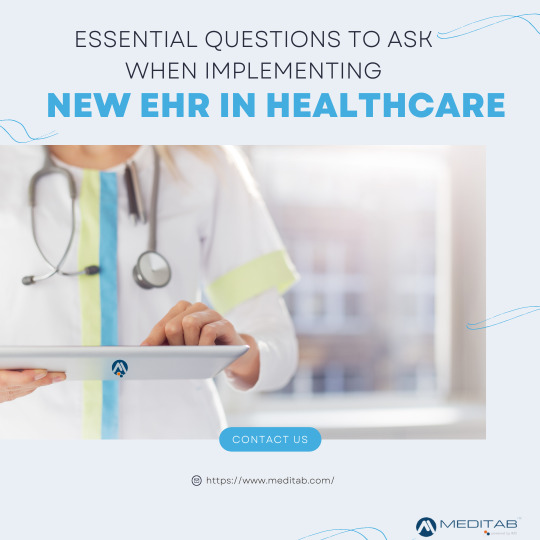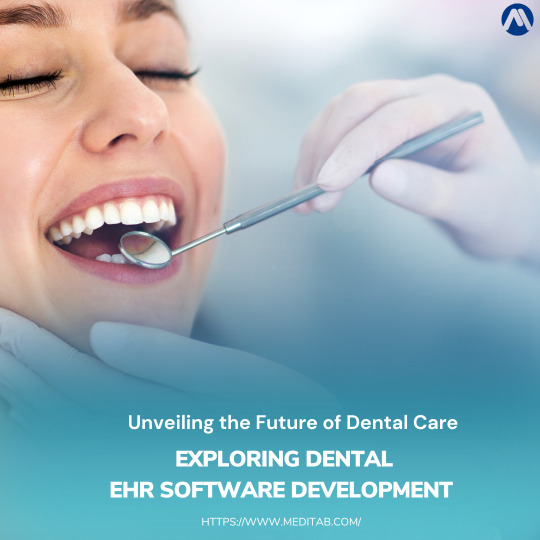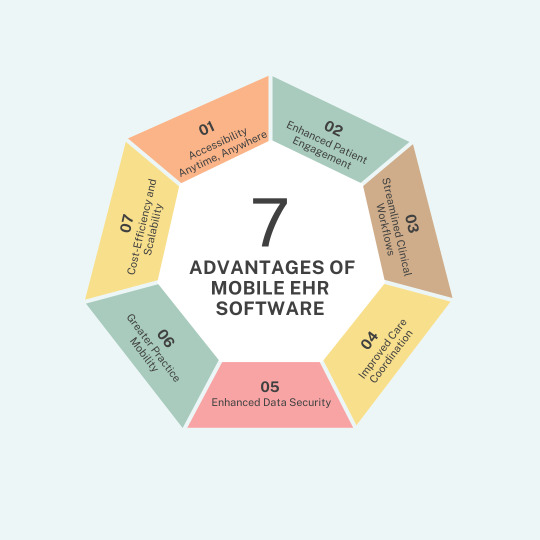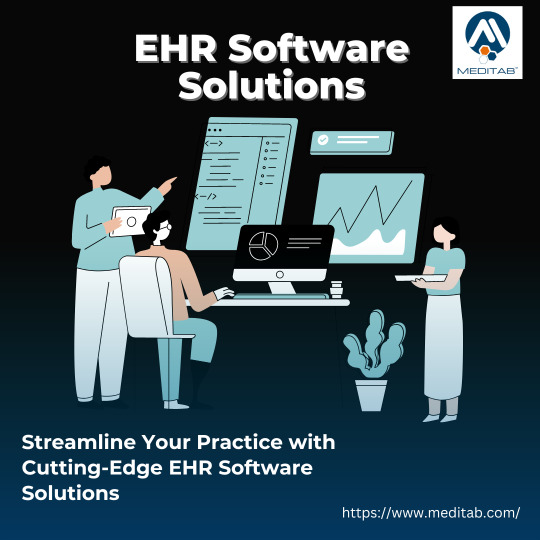Don't wanna be here? Send us removal request.
Text
Breaking Down Barriers: The Importance of Interoperability in Healthcare
In today's digital age, the adoption of Electronic Health Record (EHR) software has transformed the way healthcare providers manage patient information and deliver care. EHR solutions streamline processes, enhance communication, and improve patient outcomes. However, one critical factor that can significantly impact the effectiveness of EHR systems is interoperability. Let's explore why interoperability matters in healthcare and how it can benefit patients, providers, and the healthcare ecosystem as a whole.

What is Interoperability in Healthcare?
Interoperability refers to the ability of different healthcare systems, software, and devices to securely exchange and use patient information seamlessly. In other words, interoperability enables EHR solutions from different vendors to communicate with each other and share data efficiently, regardless of the platform or technology used.
Why Does Interoperability Matter?
Enhanced Care Coordination: Interoperability enables healthcare providers to access comprehensive patient information from various sources in real-time, facilitating seamless care coordination across different specialties, settings, and organizations. This ensures that providers have a complete picture of a patient's medical history, medications, allergies, and treatment plans, leading to more informed decision-making and better outcomes.
Improved Patient Safety: By promoting the exchange of accurate and up-to-date patient information, interoperability helps reduce the risk of errors, duplicate tests, and adverse drug events. This enhances patient safety and reduces the likelihood of medical errors that can result from incomplete or fragmented health records.
Efficient Workflow: Interoperable EHR software solutions streamline workflows by eliminating the need for manual data entry, faxing, and paper-based processes. This saves time, reduces administrative burden, and allows healthcare providers to focus more on patient care, ultimately improving efficiency and productivity.
Empowered Patients: Interoperability gives patients greater control over their health information, allowing them to access and share their medical records securely with other healthcare providers as needed. This promotes patient engagement, empowers individuals to take an active role in their healthcare decisions, and fosters collaboration between patients and providers.
Interoperability Standards: To achieve seamless data exchange, interoperability standards such as HL7 (Health Level Seven) and FHIR (Fast Healthcare Interoperability Resources) play a crucial role. These standards establish common formats, protocols, and vocabularies for exchanging health information, ensuring compatibility and consistency across different systems.
Interoperability and Population Health Management: Interoperable EHR solutions facilitate population health management initiatives by aggregating and analyzing data from diverse sources. This enables healthcare organizations to identify trends, track outcomes, and implement targeted interventions to improve the health of entire patient populations.
Conclusion
In an increasingly interconnected healthcare landscape, interoperability is essential for optimizing patient care, improving clinical outcomes, and driving innovation. By breaking down data silos and enabling seamless information exchange, interoperable EHR software solutions empower healthcare providers to deliver more coordinated, efficient, and patient-centered care.
At Meditab, we recognize the critical role that interoperability plays in advancing healthcare delivery. Our comprehensive EHR solution is designed to promote interoperability, enabling seamless data exchange and collaboration across the healthcare continuum. To learn more about our interoperable EHR software solution and how it can benefit your practice, visit our website here or contact us today.
Together, let's embrace interoperability and harness the power of connected health to transform the future of healthcare delivery.
#ehr software#ehr solutions#ehr software companies#ehr integration#interoperability#interoperability healthcare
0 notes
Text
0 notes
Text
Essential Questions to Ask When Implementing a New EHR in Healthcare
In the rapidly evolving landscape of healthcare technology, Electronic Health Record (EHR) software has become a cornerstone for modern medical practices. Implementing a new EHR solution is a significant undertaking that can have far-reaching implications for efficiency, productivity, and patient care. To ensure a seamless transition and maximize the benefits of the new system, healthcare providers must ask the right questions throughout the implementation process. Here are some essential questions to consider:

What are our specific needs and goals?
Before selecting an EHR software solution, it's crucial to identify the unique needs and goals of your healthcare practice. Consider factors such as practice size, specialty, workflow requirements, and compliance regulations. This understanding will guide you in choosing an EHR system that aligns with your objectives and enhances your operational efficiency.
Is the EHR software user-friendly and intuitive?
User adoption is key to the success of any EHR implementation. Evaluate the user interface and navigation of the EHR software to ensure it is intuitive and user-friendly for clinicians, administrative staff, and other stakeholders. A well-designed interface can streamline workflows and minimize training requirements, facilitating a smoother transition to the new system.
Does the EHR solution integrate with existing systems and workflows?
Seamless integration with existing systems and workflows is essential to avoid disruptions and maximize efficiency. Inquire about the EHR software's compatibility with other healthcare IT systems, such as practice management software, billing systems, and laboratory interfaces. Integration capabilities can streamline data exchange and improve interoperability across systems.
What security measures are in place to protect patient data?
Protecting patient data is paramount in healthcare, especially with the increasing prevalence of cyber threats and data breaches. Ensure that the EHR software solution complies with industry standards for data security and privacy, such as HIPAA regulations. Inquire about encryption protocols, access controls, audit trails, and other security features to safeguard sensitive patient information.
What training and support options are available?
Comprehensive training and ongoing support are essential for successful EHR implementation and user adoption. Ask about the training resources, documentation, and support channels provided by the EHR vendor. Look for opportunities for onsite training, webinars, and user forums to empower your staff and address any questions or concerns that may arise during the transition period.
How does the EHR software facilitate customization and scalability?
Every healthcare practice has unique requirements that may evolve over time. Evaluate the customization capabilities of the EHR software solution to tailor workflows, templates, and clinical decision support tools to your specific needs. Additionally, consider the scalability of the EHR system to accommodate future growth and expansion without significant disruptions or additional costs.
What are the costs and pricing structure of the EHR solution?
Implementing a new EHR solution involves various costs, including licensing fees, implementation services, training, and ongoing support. Understand the pricing structure of the EHR software, including any upfront costs, subscription fees, and additional charges for customization or upgrades. Evaluate the total cost of ownership and return on investment to make informed financial decisions.
For healthcare providers seeking a comprehensive EHR software solution, Meditab offers a range of customizable and user-friendly EHR solutions designed to streamline workflows, enhance patient care, and improve practice efficiency. With features such as integrated telemedicine, e-prescribing, and interoperability, Meditab's EHR software empowers healthcare providers to deliver high-quality care while maximizing productivity and profitability.
To learn more about Meditab's EHR software solutions and how they can benefit your healthcare practice, visit Meditab and explore their innovative healthcare IT solutions tailored to your specific needs and goals.
0 notes
Text
0 notes
Text
Unveiling the Future of Dental Care: Exploring Dental EHR Software Development
In today's digital age, technological advancements have transformed various aspects of healthcare, including the field of dentistry. As dental professionals strive to enhance patient care, streamline administrative tasks, and improve overall efficiency, the adoption of Electronic Health Record (EHR) software has become increasingly prevalent. Among the pioneers in this domain is Meditab, a leading provider of comprehensive EHR solutions tailored to the unique needs of dental practices. Let's delve into the world of dental EHR software development and explore the myriad benefits it offers to dental professionals and patients alike.

Understanding Dental EHR Software:
Dental EHR software serves as a centralized digital platform that enables dental practices to manage patient records, treatment plans, appointments, and administrative tasks efficiently. Unlike traditional paper-based systems, EHR software digitizes and automates various aspects of dental practice management, facilitating seamless communication, data accessibility, and comprehensive patient care.
Key Features and Functionalities:
Meditab's dental EHR software encompasses a wide range of features and functionalities designed to streamline workflows and optimize practice operations. These include:
Patient Records Management: Digitally store and access patient demographics, medical histories, treatment notes, and diagnostic images securely within a centralized database.
Treatment Planning and Documentation: Create detailed treatment plans, chart existing conditions, document procedures performed, and track progress over time for each patient.
Appointment Scheduling: Efficiently schedule appointments, manage calendars, send automated reminders to patients, and minimize appointment wait times using intuitive scheduling tools.
Billing and Revenue Cycle Management: Streamline billing processes, generate accurate invoices, verify insurance coverage, and track payments seamlessly to optimize revenue cycle management.
Clinical Decision Support: Access built-in clinical decision support tools, including drug interaction checks, treatment guidelines, and patient education resources, to enhance clinical decision-making and patient outcomes.
Benefits of Dental EHR Software:
The adoption of dental EHR software offers a plethora of benefits to dental practices, dental professionals, and patients alike, including:
Enhanced Efficiency: Streamline administrative tasks, reduce paperwork, and automate routine processes to improve practice efficiency and productivity.
Improved Patient Care: Access comprehensive patient records, treatment histories, and diagnostic images instantly to deliver personalized, evidence-based care and enhance patient satisfaction.
Enhanced Communication: Facilitate seamless communication and collaboration among dental team members, specialists, and patients through secure messaging and telehealth capabilities.
Data Security and Compliance: Ensure the security and privacy of patient health information (PHI) by adhering to stringent data security standards and regulatory requirements, such as HIPAA compliance.
Scalability and Flexibility: Adapt to evolving practice needs, scale operations, and accommodate growth seamlessly with customizable EHR solutions tailored to the unique requirements of each dental practice.
Conclusion:
In conclusion, dental EHR software development represents a pivotal advancement in modern dentistry, revolutionizing the way dental practices manage patient care, streamline workflows, and optimize practice operations. With innovative solutions from industry leaders like Meditab, dental professionals can harness the power of technology to deliver exceptional patient experiences, improve clinical outcomes, and drive practice growth in today's competitive healthcare landscape. Embrace the future of dental care with dental EHR solution and embark on a journey toward enhanced efficiency, productivity, and patient satisfaction in your dental practice.
0 notes
Text
0 notes
Text
The Advantages of Mobile EHR Software: 7 Key Benefits
In today's fast-paced healthcare environment, the integration of technology has become essential for enhancing patient care and streamlining workflows. Among the many innovations in this field, Mobile Electronic Health Record (EHR) software stands out as a game-changer, offering a wide array of benefits for healthcare providers. As a leading provider of EHR solutions, Meditab understands the importance of mobile functionality in modern healthcare settings. Let's explore the top seven benefits of Mobile EHR Software for Meditab users:

1. Accessibility Anytime, Anywhere
One of the primary advantages of Mobile EHR Software is the ability to access patient records and clinical data anytime, anywhere. Whether healthcare providers are in the office, hospital, or on-the-go, they can securely access patient information using their mobile devices. This level of accessibility promotes continuity of care and allows for timely decision-making, ultimately improving patient outcomes.
2. Enhanced Patient Engagement
Mobile EHR Software empowers patients to actively participate in their healthcare journey. With features such as patient portals and secure messaging, Meditab users can engage with their patients more effectively. Patients can review their medical records, communicate with their healthcare providers, schedule appointments, and access educational resources conveniently through their mobile devices. This enhanced communication fosters stronger patient-provider relationships and encourages patient involvement in their own care.
3. Streamlined Clinical Workflows
By integrating Mobile EHR Software into their practice, healthcare providers can streamline clinical workflows and improve operational efficiency. Tasks such as charting, documentation, and prescription management can be completed in real-time using mobile devices, reducing administrative burdens and freeing up valuable time for patient care. With Meditab's intuitive interface and customizable templates, clinicians can navigate the EHR system effortlessly, allowing for more efficient workflow management.
4. Improved Care Coordination
Effective care coordination is crucial for delivering high-quality healthcare services, especially in multidisciplinary settings. Mobile EHR Software facilitates seamless communication and collaboration among healthcare team members, regardless of their location. Physicians, nurses, specialists, and other healthcare professionals can securely share patient information, coordinate treatment plans, and track progress in real-time, leading to more coordinated and comprehensive care delivery.
5. Enhanced Data Security
Maintaining the confidentiality and security of patient health information is a top priority in healthcare settings. Mobile EHR Software from Meditab incorporates robust security features to safeguard sensitive data against unauthorized access and breaches. Advanced encryption protocols, multi-factor authentication, and remote data wiping capabilities ensure that patient information remains protected, even when accessed from mobile devices.
6. Greater Practice Mobility
For healthcare providers who value flexibility and mobility, Mobile EHR Software offers unparalleled freedom to work from anywhere. Whether attending rounds, conducting home visits, or attending conferences, clinicians can stay connected to their practice and access essential clinical tools using their smartphones or tablets. This increased mobility enables healthcare providers to deliver patient-centered care without being confined to a traditional office setting.
7. Cost-Efficiency and Scalability
Implementing Mobile EHR Software can lead to significant cost savings for healthcare practices in the long run. By reducing paper-based processes, minimizing transcription errors, and streamlining administrative tasks, Meditab users can achieve greater operational efficiency and resource utilization. Additionally, as practices grow and evolve, Mobile EHR Software offers scalability to accommodate changing needs and expanding patient populations, making it a cost-effective investment for the future.
In conclusion, Mobile EHR Software from Meditab offers numerous benefits for healthcare providers, ranging from improved accessibility and patient engagement to streamlined workflows and enhanced data security. By embracing mobile technology, healthcare practices can transform the way they deliver care, leading to better outcomes for both patients and providers. With Meditab's innovative solutions, the future of healthcare is mobile, efficient, and patient-centric.
0 notes
Text
Streamline Your Practice with Cutting-Edge EHR Software Solutions
In today's fast-paced healthcare landscape, efficiency and accuracy are paramount. Medical practices worldwide are constantly seeking ways to streamline their operations while providing top-notch patient care. One essential tool that has revolutionized the way healthcare providers manage patient data and workflows is Electronic Health Record (EHR) software.
At Meditab, we understand the challenges faced by healthcare professionals in managing vast amounts of patient information securely while adhering to stringent regulations. That's why we've developed innovative EHR software solutions tailored to meet the unique needs of medical practices of all sizes.
The Power of EHR Software
EHR software is more than just a digital repository for patient records; it's a comprehensive system designed to streamline every aspect of practice management. From appointment scheduling and billing to charting and e-prescribing, EHR software consolidates essential functions into one centralized platform, eliminating the need for cumbersome paper-based systems.

Key Features and Benefits
Efficient Charting and Documentation: Our EHR software offers intuitive charting tools that enable healthcare providers to create comprehensive and accurate patient records quickly. With customizable templates and seamless integration with diagnostic devices, documenting patient encounters has never been easier.
Interoperability: Our EHR software facilitates seamless communication and data exchange between different healthcare systems, ensuring that providers have access to the most up-to-date patient information when they need it most. This interoperability enhances collaboration among care teams and improves patient outcomes.
Revenue Cycle Management: From automated charge capture to real-time claims processing, our EHR software streamlines the revenue cycle management process, helping practices maximize reimbursements and minimize denials. With built-in reporting and analytics tools, providers can gain valuable insights into their financial performance and identify areas for improvement.
Patient Engagement Tools: Engaging patients in their healthcare journey is essential for improving outcomes and fostering long-term relationships. Our EHR software offers a range of patient engagement tools, including secure messaging, patient portals, and telemedicine capabilities, enabling practices to deliver personalized care and enhance patient satisfaction.
Compliance and Security: We understand the importance of safeguarding patient data and ensuring compliance with industry regulations. Our EHR software is built with robust security features, including data encryption, access controls, and regular audits, to protect sensitive information and maintain compliance with HIPAA and other regulatory standards.
Conclusion
In today's digital age, leveraging advanced technology is essential for staying ahead in the competitive healthcare landscape. Meditab's EHR software solutions empower medical practices to streamline their operations, enhance patient care, and achieve greater efficiency and profitability. With customizable features, scalable architecture, and dedicated support, our EHR software is the ideal choice for practices looking to elevate their performance and deliver exceptional care to their patients.
Experience the power of Meditab's EHR software and take your practice to new heights. Schedule a demo today and discover how our innovative solutions can transform your practice for the better.
0 notes
Text
1 note
·
View note